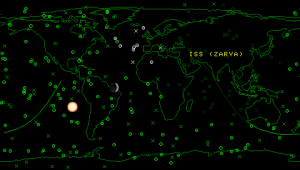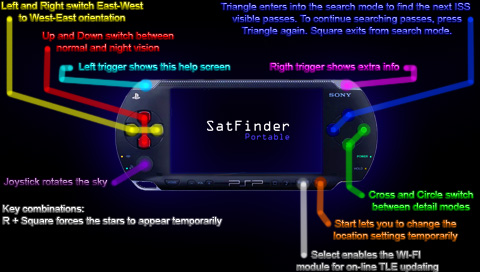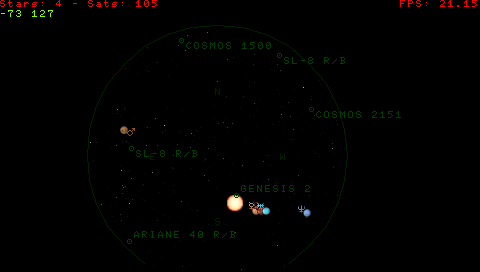| SatFinder Portable | |
|---|---|
 | |
| General | |
| Author | Pedro J. |
| Type | Other |
| Version | 1.3.2 |
| License | Mixed |
| Last Updated | 2008/09/01 |
| Links | |
| Download | |
| Website | |
SatFinder Portable is an astronomy application with its main purpose being a tool to find artificial satellites in the sky that can be seen with the naked eye. It focuses primarily on finding the International Space Station (ISS). It is available in English and Spanish, coded by Pedro J using Lua (includes source code).
It was submitted to the Scenery Beta 2008 (PSP Applications, 2nd place).
Installation
Note: It is advised to uninstall the previous version first, deleting the program directories in the GAME or GAME150 directory. The installer will find the previous versions and will not install the new one, simply keeping the TLE files updated online.
Connect your PSP to your PC vis USB and execute the accompanying installer SatFinderUpdater.exe to install SatFinder.
Once the installation process is finished, you will be asked to input the coordinates of your location.
It is essential to have internet from this point, as it will automatically look for updates and obtain information for the most visible artificial satellites from the Internet.
Tutorials written by developer can be found here and here (in Spanish).
User guide
What does it do?
- Determine the current position of the stars, the sun, and the moon in the sky. In addition, the moon is shown with its current phase. They will serve as a reference to visually locate the satellites.
- Determine when the next time the International Space Station (ISS) can be seen in your area will be.
- It has a voice assistant that communicates important events:
- When it is night or day.
- When the Sun or the Moon rises/sets.
- When a satellite appears above the horizon and there was not before.
- When a satellite appears above 30º of elevation and before there was none.
- When a satellite appears above 60º of elevation and before there was none.
- When a satellite appears above 80º of elevation and before there was none.
- When the ISS appears.
- When the ISS reaches its maximum elevation.
- When the ISS disappears.
- In addition, it always tells you in which direction you have to look: N, NE, E, SE, S, SW, W, NW.
Additional features
- Change the location of the observer both from the installer (it remains permanent), and from the PSP directly (but temporarily).
- Switch between day and night vision.
- Change the orientation of the sky.
- Show the name of the constellations.
- Possibility of updating TLE files online via WiFi.
The best time to see satellites
Generally after the sun sets for 2 or 3 hours and just before the sun rises (also for 2 or 3 hours) that the satellite is above the horizon, the sky be dark enough, and that the satellite is illuminated by the sun and not overshadowed by the earth.
Developer recommended to update the information contained in the TLE files periodically, at least before each observation, for the most accurate results.
3 classes of satellites (highlight)
The ISS (international space station) is a gigantic satellite compared to the rest, and its brightness is spectacular. It is the only one that can be seen regardless of the light pollution conditions in the sky. In the middle of Madrid you could see it without problems.
Normal satellites of brightness, although sometimes weak, assured. These are small satellites but they are very close to the earth (about 300 km high). Almost all satellites would go in here.
Satellites with indeterminate brightness (strong to weak), but not assured. This includes all the Iridium satellites, almost a hundred satellites that form rings and that are part of a bankrupt global telephone system. Due to the light they reflect, it is not enough to make them visible to the naked eye because they are further away (800 km high), but by having antennas that reflect the sun as if they were mirrors, it can give an intense shine that can last at least 20 seconds if said mirror is aligned with the sun so that it reflects its rays to where we are observing.
All Iridiums do not behave the same: some shine suddenly and others blink (they rotate on themselves quickly). The latter are Iridium out of order already out of control.
Controls
Triangle/Square - Search for next views of the ISS
Square - Cancel the search for ISS
Analog - Rotate map, Zoom
D-Pad - Switch between day and night vision
L - Show World Map
R - View extra information
Cross - Sky detail configuration
Circle/Cross - Show the name of the constellations
Select - Update of TLE files by WIFI
Start - Change the location of the observer
Screenshots


Changelog
version 1.3.2
- Change of Luaplayer. Now the HW7 RC1 version is used
- Fixed a small bug that incorrectly displayed the decimals of the coordinates in the information screen.
- Fixed an infinite loop when trying to update TLE files without success due to not being able to find an access point. Now go back to the main screen.
- The phases of the moon are in UTC format, universal time. A label has been added to warn of this and avoid confusion.
- Iridium satellites are now optional. It can be configured in the configuration screen.
- Adapted for participation in the Scenery Beta 2008.
version 1.3.1
- Improved downloading of TLE files through WIFI. Now it takes much less.
version 1.3
- Changed the LuaPlayer used. Now LuaPlayerHW6.5 Wifi EDITION.
- Fixed the function that calculated the moon phases (wrong in version 1.2).
- Incorporation of useful information in a top bar:
- Drums.
- Limiting magnitude of the stars that are being shown.
- Updates per second (FPS).
- Zoom Status.
- Rotation status.
- Time (hour, minutes and seconds).
- Changed the appearance of the information screen.
- Added an update of the position and trails of all satellites when a long time has passed without drawing. A message appears warning: "Updating satellites ..."
- By selecting a certain satellite in the list of next satellites to be seen, its route is traced in the sky and warns you when it will appear.
- The program closes much faster (due to the new luaplayer).
- Better calculated the percentage of illumination of the lunar disk.
- The stars become brighter when you zoom in.
- Wifi functionality working both in FAT and SLIM.
- Available in English and Spanish (already translated, AeroPSP).
- Sound issues fixed.
version 1.2.1
- Improvements in the graphic environment.
- Fully compatible with PSP Slim (except download via net).
version 1.2
- Totally different appearance. Everything is drawn based on a configurable color.
- Celestial vault totally mobile, with unlimited zoom.
- New ISS sighting search system.
- New system to search for sightings of any satellite in the next half hour.
- New configuration screen. Persistent configuration.
- We can configure the colors to use day and night.
- Screenshots to the PICTURE directory.
- New way of drawing satellite trails. They are completely drawn from scratch. You don't have to wait for the satellites to move.
- Possibility of tracing the path that a satellite will follow in the sky.
- Number of stars to display configurable by changing the limit magnitude.
- Constellations with long names.
- All documented in manuals on the official website.
- Add a link in the favorites list of our PSP browser, for easier access.
version 1.1 Beta
- Downloading TLE files by Wifi works.
- New data screen by pressing R.
- New world map screen by pressing L. It shows all the satellites positioned in the world. The ISS is featured and showing its trajectory in the next hour.
- Sky detail configuration. By pressing X you can select what you want to see in the sky. Disabling stars or satellites does not work. The rest yes.
- Zoom with the joystick up and down. It is a 90 degree centered zoom. It cannot move freely. Useful for cities that see little sky.
- Rotation of the sky, with the joystick left and right. Useful for not moving the console.
- Acoustic and textual announcement of the sunrise and sunset and moonlight.
- Prediction of when the sun and moon will rise and set.
- Prediction of when the night will start and end.
- Prediction of the phases of the moon.
- New informed boot system.
- Fixed the position of the moon, wrong in version 1.0.
- Fixed other problems of version 1.0.
- New more elegant /simple installation system and extensible to all languages .
version 1.0
- Initital release.
Credits
Razorblade, Dr. TSKelso, John Walker (Home Planet) and John A. Magliacane (Predict).
External links
- Author's website - http://perso.gratisweb.com/pedroj.fernandez
- SceneBeta - https://psp.scenebeta.com/noticia/satfinder-portable
- ElOtroLado - https://www.elotrolado.net/hilo_satfinder-portable-1-0-sale-a-la-luz_851635